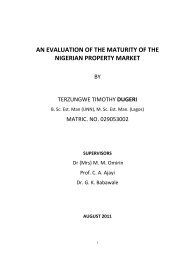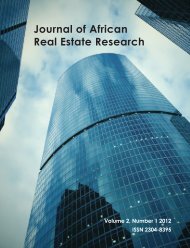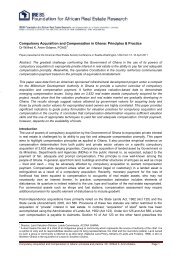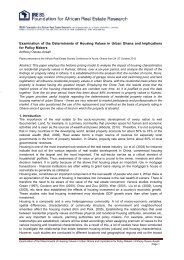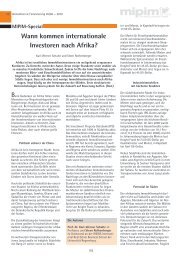You also want an ePaper? Increase the reach of your titles
YUMPU automatically turns print PDFs into web optimized ePapers that Google loves.
exemption for interest paid abroad by a resident in respect ofdebentures issued by a foreign company for the purposes ofraising loan capital to carry out business in Uganda. A 6%withholding tax is levied on any payment to a person in Ugandafrom the Government, a Government institution, a localauthority, any company controlled by the Government or anyperson designated in a notice issued by the Minister of Finance ifsuch payment in aggregate exceeds Ushs 1 000 000 and relatesto the supply of any goods or any service. The Minister forFinance may exempt companies from paying this withholdingtax.Non-residents are also subject to a 15% withholding tax onroyalties, management fees, entertainers and sports personalincome, natural resource payments and equipment leases onincome earned from Uganda.Key Industry SectorsThe following is an outline of investment opportunities in someof the key areas:Uganda has a burgeoning oil sector. The first real depositwas confirmed in 2006 and there are now 32 wells in theLake Albertine Graben. Large quantities of natural gasdeposits have also been found. The total proven oilreserves are well over 6 billion barrels supportingproduction of 100 000 barrels of oil per day for over 20years. This also provides opportunities for ancillary industries;floriculture gives the most attractive return on investmentin agriculture in Uganda (30-40%) but requires highInvestment;Uganda’s energy consumption is still greater than itsproduction resulting in many areas having insufficientpower;Uganda has many inadequately explored miningopportunities. Minerals such as limestone for cement,gold, tin and tungsten are available for mining;fish farming is one of Uganda’s leading foreign exchangeearners. Opportunities include the processing of cannedfish, aquaculture and fish leather processing;a number of investment opportunities exist in the textilesector. These include growing cotton for export,establishing ginneries, supplying inputs to farmers andproducing edible oil from cotton;given the rate at which the Ugandan population isincreasing, there is need for affordable housing.Opportunities are available in the construction industryand include the supply of low cost housing in the urban andsemi-urban areas, housing and mortgage finance,construction equipment and building materials;food and beverage sector opportunities are availablemainly in the utilization of local agricultural raw materialsto manufacture agro-processed products with exportpotential. Additional opportunities exist for supportingindustries to the sector for example in packaging, valueadded processing and cold storage at export points;there are opportunities in the education sector especiallyat post primary level including secondary education,technical and vocational education, developing computerskills and managerial skills training;opportunities in the tourism sector include touroperations, water sports and related activities,accommodation, conferences and incentives travel,national park concessions, privatisation and joint ventureswith existing players;there is enormous potential in the following financialservices areas: merchant banking, development banking,commercial banking, discount houses, insurance services,leasing, mortgage financing, building societies, microfinancingservices, and specialized training institutions.Intellectual PropertyProtection of patents, certain trademarks, design and copyrightsis provided for by statute. Uganda has signed the ParisConvention for the Protection of Industrial Property, theConvention establishing the World Intellectual PropertyOrganisation (WIPO) and the <strong>Africa</strong>n Regional IndustrialProtection Organisation (ARIPO).Legal SystemThe Ugandan legal system is based on English common law witha written Constitution which guarantees basic human rights.The Supreme Court of Appeal is the highest court. The HighCourt of Uganda has unlimited original jurisdiction to hear anddetermine any proceedings under any law.International Organisations and AgreementsMembership of international <strong>org</strong>anisations includes theCommon Market for Eastern and Southern <strong>Africa</strong>, PreferentialTrade Area, East <strong>Africa</strong>n Community and the Commission forEast <strong>Africa</strong>n Co-operation, which comprises Kenya, Uganda andTanzania. Uganda has, in addition to double tax agreements,signed bilateral trade and investment promotion agreementswith the United Kingdom, Italy, Kenya, Tanzania, South <strong>Africa</strong>,Egypt, India, China, Germany, the Netherlands and several othercountries.TelecommunicationsThere are currently eight mobile operators in the countryincluding Uganda Telecom Limited (UTL), Mobile TelephoneNetwork Uganda (MTN Uganda), Warid Telecom, OrangeTelecom and Airtel Uganda. Fax and email access is widelyavailable throughout Kampala and other major towns.Labour RelationsThere are several labour laws including the Employment Act andthe Workers’ Compensation Act. Local labour is plentiful andunions are not influential although collective bargainingagreements are in force for some companies.83




